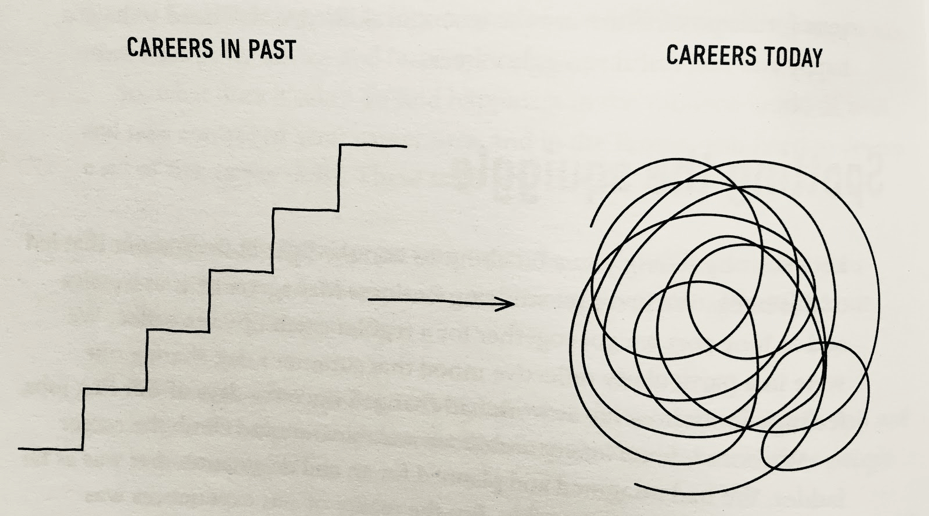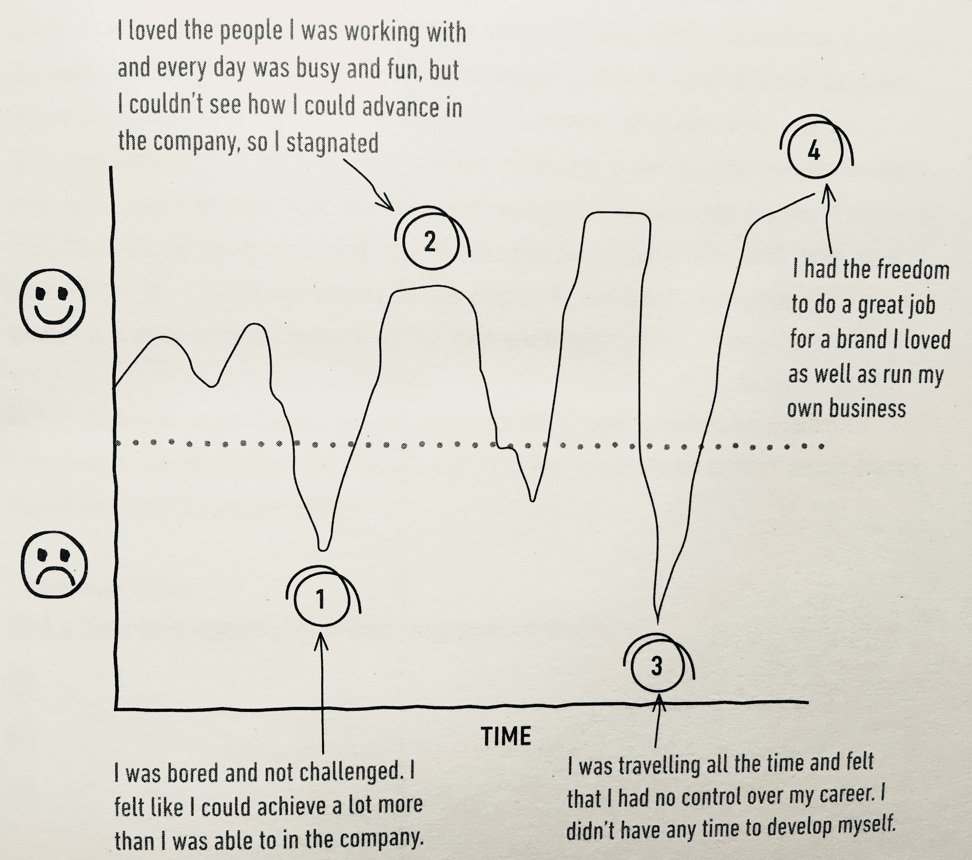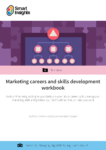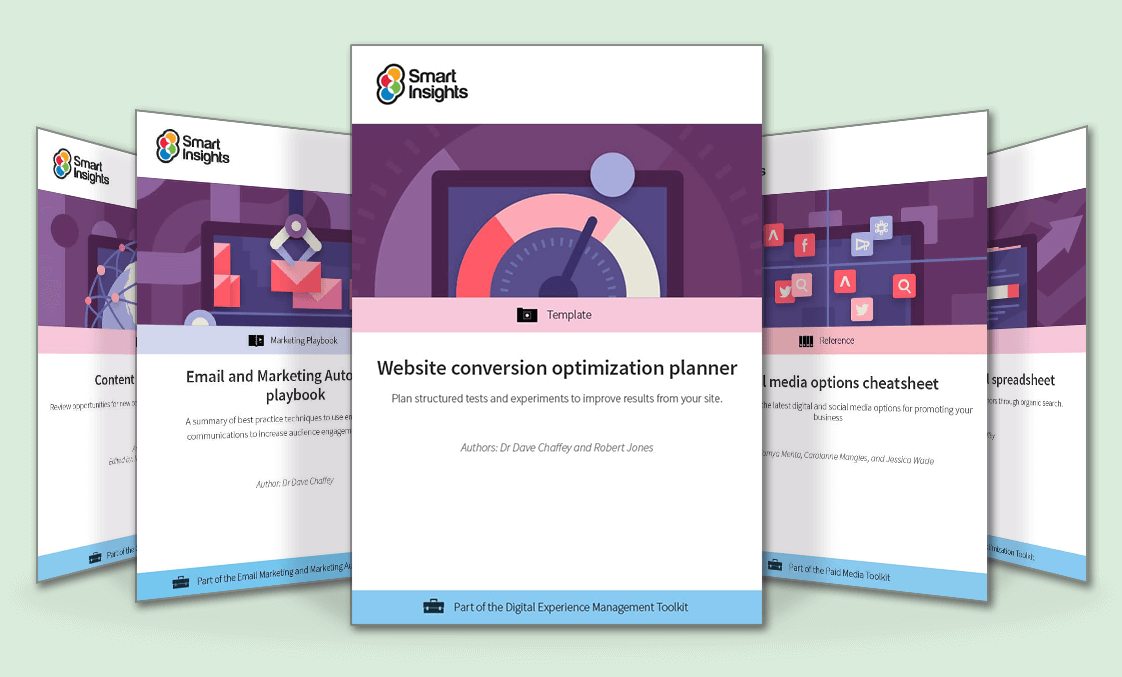How to navigate a 'squiggly career'
When many of us consider the word ‘career’, we think about climbing a corporate ladder and following a predictable, linear path to promotion. This was certainly my expectation when I entered the workforce after university; the advice was to join a company as a graduate trainee and move through the ranks to a senior role.
But whilst the idea of a traditional career may still be the case for some, the last ten years has transformed many people’s professional working experiences and their expectations for what a career will provide. This is true across most professions, but especially true for marketing, where the rise of the internet, social media and digital channels has disrupted the traditional paradigm.
Navigating the ‘squiggly career’
In spring 2018, whilst I was in between jobs, I discovered a podcast called ‘Squiggly Careers’. Presented by Sarah Ellis and Helen Tupper, it covered a huge range of topics, from managing stress to building confidence. Whilst I found the content of the podcasts immensely useful, the concept of a ‘squiggly career’ itself also resonated. Although both Helen and Sarah had worked for large companies, they had also discovered that their careers had been somewhat ‘squiggly’ when compared to linear careers of the past.

Source: The Squiggly Career by Helen Tupper & Sarah Ellis.
Five skills to thrive in a squiggly world
According to Sarah Ellis, we're living in a world where moving frequently and fluidly between roles, industries, locations and careers is becoming the new normal. Squiggly careers can feel stressful and overwhelming, but if you know how to make the most of them, they can also be full of opportunity, freedom and purpose.
More than anything, the squiggly career is a mindset. It’s not about moving around and changing jobs all the time. It’s about how you think about your learning, development and growth in a more malleable, dynamic way.
Many people aspire to be ‘successful’ by climbing a corporate ladder, but this way of thinking isn’t always helpful. For example, only 6% of workers in the UK work 9 to 5. The world of work is less traditional than it once was and we’re working in very different ways. We’re also living longer so many of us want to work for longer, too, which has implications for the type of work we can do.
Although the squiggly nature of work can be a good thing, it can also cause stress and anxiety in others. So the focus of this post will look at how we can spend more time enjoying our careers by looking at five skills to thrive in an increasingly squiggly world:
1. Strengths vs. weaknesses
According to Jim Collins, author of Good to Great, great companies focus on those few things they can be the best at. The same is true for people. Leaders who can identify their strengths and put them into practice go from being very good to being the best in their fields.
The lesson here is to focus on our strengths rather than our weaknesses, and accept that we cannot be good at everything. Sarah provides a very helpful tip: spend 80 percent of your time optimizing your current strengths, and 20 percent working on other areas, for example skills that may be useful for the future.
The key is to be able to talk about the two or three things that make you distinctive and stand out from the crowd. This is important not only for your self-confidence but for other people's confidence in you, too. For other people to match you to opportunities, you need to be aware of your strengths and let others know, too.
2. Values
Values are what motivate and drive us. If strengths are what you do, values are who you are. Values are developed at a young age and sit within our subconscious throughout our lifetimes and can act as a ‘career compass’, enabling us to identify what success really means for us and what will ultimately make us happy.
Values matter in our careers and understanding them and how they connect to your work can help in three ways:
-
They enable you to be yourself at work
-
They allow you to build empathy and understand others’ perspectives
-
They enable us to make better decisions
In the Squiggly Career, there are some great exercises to help you to understand and identify your values. However, before you even get to this stage there are some helpful guiding principles to keep in mind:
Values that are most important to you that you’d prioritize over other areas that matter to you
-
There are no right or wrong values -
Be honest with yourself about what is most important to you
-
Values work for and against you -
Knowing your values and other people’s can break down barriers and build bridges
Values that apply to all areas of your life, i.e. personal and professional
Understanding your values takes time (sometimes years!) but the effort is worthwhile

Source: The Squiggly Career by Helen Tupper & Sarah Ellis
3. Confidence
Confidence is about having belief in yourself and inspiring belief in the people around you. It’s important to focus on the things ‘below the surface’, including long-term resilience. There are lots of things that are out of your control and can go wrong so be clear on what is within your control.
There are three key areas of confidence to consider:
-
Confidence gremlins or limiting beliefs.
These are the things that hold you back from doing what you want, for example fear of failure. Confidence is a skill that can be learned but needs to be practiced. What actions can you take to keep them caged?
Nobody is confident by themselves. You’ll find that some of the most confident individuals surround themselves with people that challenge and believe in them. Who specifically plays a role for you in terms of your confidence?
Confident people can identify what’s good even in the tough times. Be pragmatic and realistic. It’s often easy to talk about one success from the year, but not so easy to talk about the one success from yesterday. We find it difficult to recognize the small successes so if you’re having a tough day, week or month, write down the success from each day
4. Networking
Building relationships can be something both introverts and extroverts can do. It’s about where you get your ‘energy’.
Networking is often considered to be a ‘marmite’ activity. It can be stressful for some people but energizing for others. If you’re uncomfortable with the term, think instead about ‘people helping people’ and start with how you can help others. What can you give to build relationships in a way that works for you? What relationships work right now and why?
There is value in knowing people in a smaller, deeper way versus having lots of different contacts. Networks look and feel different for everyone so it’s important to identify how this works for you, your personality and working style.
Start by identifying gaps in your current network and what you believe you can benefit from in the future. Ask yourself two questions:
-
What do I want to learn this year?
-
Who can help me?
5. Possibilities vs. plans
With so much uncertainty and ambiguity we cannot plan everything step-by-step. We, therefore, need to move to an ‘exploring’ mindset and be constantly curious about other possibilities.
You may be dead set on making only a forward step for your next career move. However, making sideways can be just as effective, enabling people to learn new skills and gain confidence for future endeavors.
Think about what you could do next through the following lenses:
-
The obvious
-
The ambitious
-
The pivot
-
The dream
Map these different possibilities and you might even notice that they start to change around, for example your ‘obvious’ might become your ‘ambitious’, or your ‘dream’ becomes your ‘obvious’! The most important takeaway here is to develop a habit where you’re constantly alert to new and different career opportunities.
Summary
The world of work and careers has changed a lot over the last decade. We’ve gone from climbing the corporate ladder to a much more ‘squiggly’ career that takes us up, down, sideways and then back up again! We’ve essentially gone from:
-
Weaknesses -> strengths
-
Comparison -> confidence
-
Applying -> exploring
-
Plans -> possibilities
-
Ladders -> squiggles











